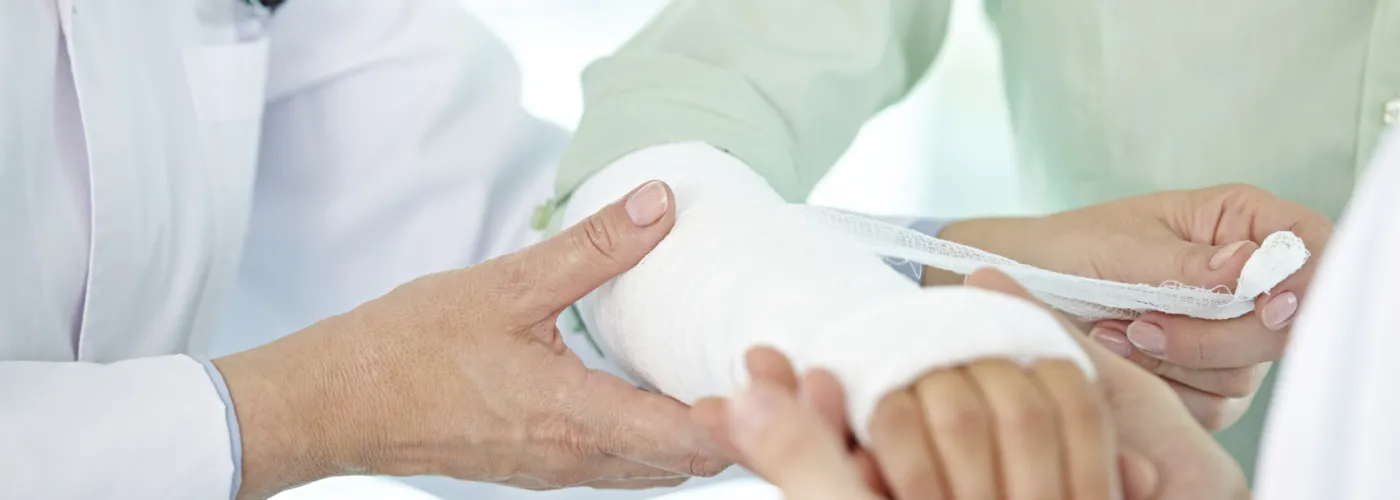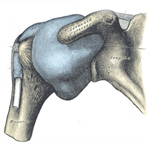
Acromioclavicular Joint (AC)

AC Injuries
Acromioclavicular separations or sprains can vary in severity, depending on the extent of injury to the stabilizing ligaments and capsule.
First degree
Depending on the severity of the blow causing the injury, most of the time, only a partial tear of the acromioclavicular ligament will occur. If this is the case then only a first-degree injury is produced.
Second degree
A second-degree injury occurs when the acromioclavicular ligament is completely torn, but the coracoclavicular ligament remains intact. This can also include subluxation or partial displacement.
Third degree
The subluxation isn't always noticeable upon examination but can be confirmed on x-ray. If the force is strong enough to tear the acromioclavicular ligament, the coracoclavicular ligament, and the capsule, it is known as a third-degree injury. A third-degree injury is obvious on examination and can be confirmed on x-ray.
Who
Pinnacle Orthopedic doctors have revealed that athletes are the most likely candidates for AC injuries, more specifically football players and hockey players. These being the sports that usually put lots of stress on the shoulders in general.
Research has shown that AC injury is to blame for 40% of shoulder injury cases and 10% of these occur in collision or contact sports. An athlete who has an AC injury will often leave the field/ice holding his/her arm close to the side. The patient will have to see an expert in sports medicine to get an accurate diagnosis and rule out other possible injuries.
It's very important to find out the exact happenings of the injury. Did the athlete fall on the outstretched arm, fall on the shoulder, or receive a severe blow to the arm (Acromial area)? It is important when examining the area to rule out pain from the contusion by manipulating the clavicle at midshaft.
Sometimes there's an obvious deformity or easily detected motion at the AC joint which makes it easier for an orthopedic doctor to diagnose the injury. The more difficult to diagnose is the less severe injury. Oftentimes, the athlete will be put through a variety of motion tests to get the proper diagnosis promptly.
Management
Treatment of these injuries depends on the severity. The first and second-degree sprain of the AC joint can often be treated successfully with conservative care for 2 to 4 weeks when pain is alleviated. This is usually followed up with some physical therapy to restore the normal range of motion and to strengthen the upper extremities. The treatment of a third-degree sprains' complete dislocations varies.
Some doctors think it best to be aggressive and perform an open reduction (surgery). Other doctors feel that they should be treated non-surgically because people tend to do well and can function with complete dislocations. When surgery is performed, it is usually directed at reconstruction of the conoid and trapezoid ligaments (coracoclavicular ligaments).
Return to Activity
It is important that the athletes not return to sport until they have regained full range of non-painful motion, no tenderness upon direct palpation of the acromioclavicular joint, and no pain when manual traction is applied.
Prognosis
The prognosis of these injuries is very good, obviously better for the lower grade injuries (first and second degree). However, even third-degree injuries will do well if the appropriate treatment is applied and enough rehabilitation and rest are allowed.
Pinnacle Orthopaedic Clinic
At Pinnacle, we are equipped with the latest technology and equipment needed in every step of the treatment process. Our Fellowship Trained Specialists have years of experience in dealing with various acute and chronic orthopedic cases.
To find out the best course of treatment for you AC injury, you can consult Pinnacle Orthopaedic's experts in sports medicine in the following convenient locations:
Pinnacle Orthopaedic Clinic, Canton
Pinnacle Orthopaedic Clinic, Hiram
Pinnacle Orthopaedic Clinic, East Cobb
Pinnacle Orthopaedic Clinic, Marietta
Pinnacle Orthopaedic Clinic, Woodstock
You will be guided right from assessment and diagnosis to treatment and rehabilitation, to ensure your full recovery.
If you have questions, you can always reach out to our friendly staff, who are more than willing to assist you:
Phone: 770-427-5717
Fax: 770-429-8520
Visit us at 300 Tower Road, Suite 101, Marietta, GA 30060
Make an enquire on our contact page
The material contained on this site is for informational purposes only and DOES NOT CONSTITUTE THE PROVIDING OF MEDICAL ADVICE, and is not intended to be a substitute for independent professional medical judgment, advice, diagnosis, or treatment. Always seek the advice of your physician or other qualified healthcare providers with any questions or concerns you may have regarding your health.